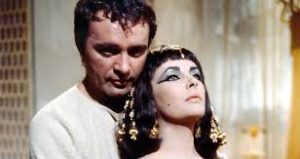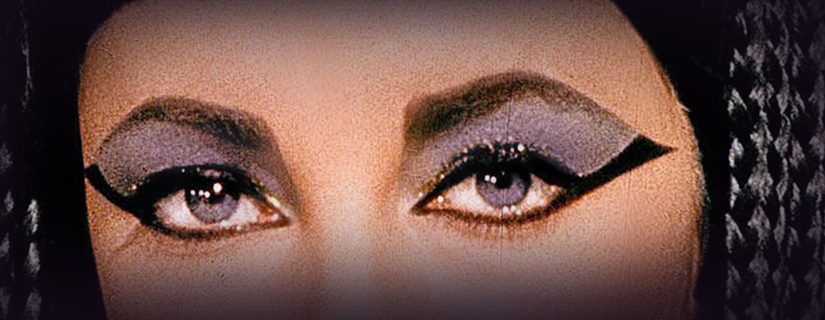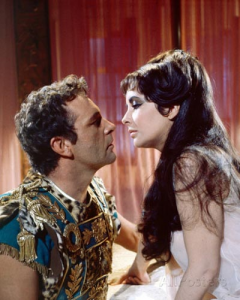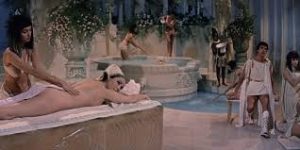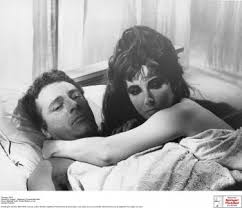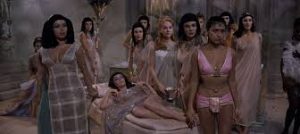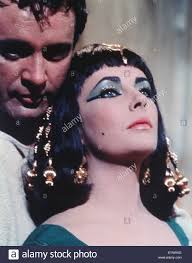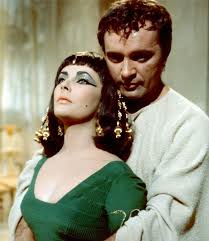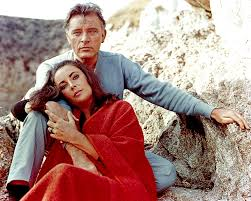SHORT TAKE:
Cleo is a brilliant stage dramedy, playing through April 29, 2018 at the Alley Theater in Houston, Texas – written by Lawrence Wright and directed by Bob Balaban, about the filming of the movie Cleopatra as seen from the perspective of the explosive affair between Elizabeth Taylor and Richard Burton, who play the cinematic lovers Cleopatra and Marc Antony.
WHO SHOULD GO:
Adults. Burton, Taylor and their relationship became the short hand definition of a passionate, torrid love affair. In addition, the movie they were filming, Cleopatra, pushed the MPAA ratings of that time to the edge of the envelope. So to show less than Mr. Balaban does would be like trying to demonstrate an atomic bomb with a birthday candle. But this means it is not appropriate for youths.
LONG TAKE:
I have rarely seen life so poetically and entertainingly imitate art and that art so analogously reflected back than in the play Cleo currently running at the Alley Theatre in Houston, Texas. And I have NEVER seen such a story more skillfully manifested. Masterfully written by  Lawrence Wright and brilliantly directed by the multi-talented
Lawrence Wright and brilliantly directed by the multi-talented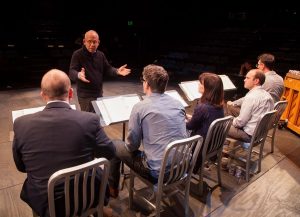 Bob Balaban, Cleo is about the romance that volcanically erupted between Elizabeth Taylor and Richard Burton during the shooting of the movie Cleopatra.
Bob Balaban, Cleo is about the romance that volcanically erupted between Elizabeth Taylor and Richard Burton during the shooting of the movie Cleopatra.
Cleopatra, for anyone under 40 and not an old movie aficionado, is a classic, epic, bombastic, spectacular that was filmed in 1963 with three of the heaviest hitting stars in Hollywood at the time – 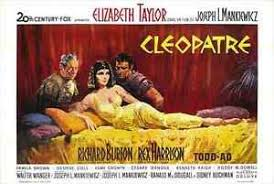
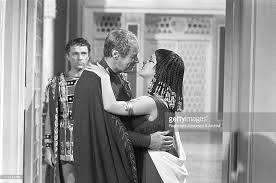 Elizabeth Taylor, Richard Burton, and Rex Harrison, and populated with some of the most solid and talented supporting actors of their era including
Elizabeth Taylor, Richard Burton, and Rex Harrison, and populated with some of the most solid and talented supporting actors of their era including 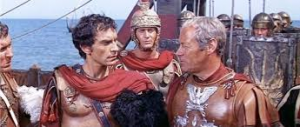 Martin Landau,
Martin Landau,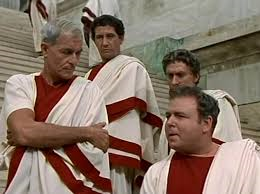 Carroll O'Connor,
Carroll O'Connor, 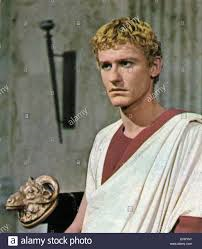 Roddy MacDowell and
Roddy MacDowell and 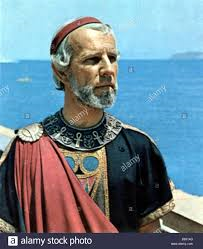 Hume Cronyn.
Hume Cronyn.
The stories surrounding this legendary moving disaster area are legion. However, Messieurs Wright & Balaban tackle the central fuse that wove its way through the making of the movie – the romance that began between the couple who for the next two decades would be known in one breath, almost as one word – Liz and Dick.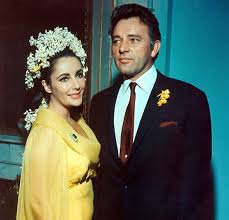
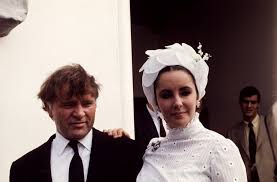 Married and divorced twice to each other and many times to others they became inseparable. Toxic to each other but unable to stay away from each other, they remained close for the rest of their lives, whether married to each other or not. Cleo tells the story of the beginning of this incendiary relationship.
Married and divorced twice to each other and many times to others they became inseparable. Toxic to each other but unable to stay away from each other, they remained close for the rest of their lives, whether married to each other or not. Cleo tells the story of the beginning of this incendiary relationship.
Cleo is funny, bittersweet, bawdy, fascinating, historically interesting, and somehow also whimsically endearing.  Lisa Birnbaum, as Elizabeth Taylor, radiates all of the subtleties of Taylor's voice and body mannerisms without creating the caricature that could have so easily emerged.
Lisa Birnbaum, as Elizabeth Taylor, radiates all of the subtleties of Taylor's voice and body mannerisms without creating the caricature that could have so easily emerged. 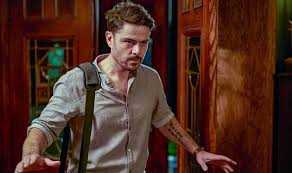 The same for Richard Short as Richard Burton. I loved the accents Short was able to swing into and out of – Burton's normal Welsh versus the high British posh that we are so used to hearing him speak.
The same for Richard Short as Richard Burton. I loved the accents Short was able to swing into and out of – Burton's normal Welsh versus the high British posh that we are so used to hearing him speak.
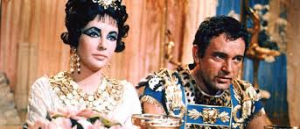 All the subtlety but unmistakable familiarity of these personalities reincarnated on stage for us is a massive credit to both the skillful writing of Mr. Wright whose dialogue lends itself to revelations and foretelling, and to the insightful direction by Mr Balaban. In other hands this could have ended up as a farce.
All the subtlety but unmistakable familiarity of these personalities reincarnated on stage for us is a massive credit to both the skillful writing of Mr. Wright whose dialogue lends itself to revelations and foretelling, and to the insightful direction by Mr Balaban. In other hands this could have ended up as a farce. 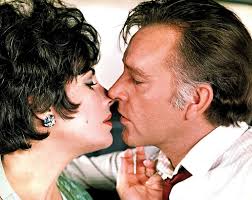 But the affection and respect Wright and Balaban have for these subjects shines through.
But the affection and respect Wright and Balaban have for these subjects shines through.  Mr. Balaban's understanding and perceptive observation of these creatures of Hollywood who are also deeply human beings is personified in the choices which he has made with these actors in particular and the production in general.
Mr. Balaban's understanding and perceptive observation of these creatures of Hollywood who are also deeply human beings is personified in the choices which he has made with these actors in particular and the production in general.

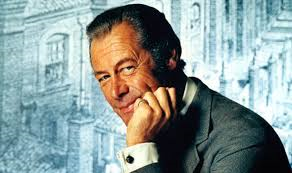 Mark Capri portrays Rex Harrison and is given a bit broader license to portray the man who was both Dr. Dolittle and Henry Higgins. Capri's larger than life performance offers a counterpoint and some comic relief to the intense proceedings sparking around him.
Mark Capri portrays Rex Harrison and is given a bit broader license to portray the man who was both Dr. Dolittle and Henry Higgins. Capri's larger than life performance offers a counterpoint and some comic relief to the intense proceedings sparking around him. 
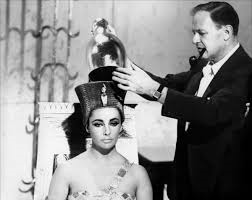 Brian Dykstra as Joe Mankiewicz occupies a Machiavellian type father position, who both struggles to keep peace amongst his cast but also tends to stir the pot just enough to elicit the dialogue and performance of which he knows these intensely talented movie stars are capable.
Brian Dykstra as Joe Mankiewicz occupies a Machiavellian type father position, who both struggles to keep peace amongst his cast but also tends to stir the pot just enough to elicit the dialogue and performance of which he knows these intensely talented movie stars are capable. 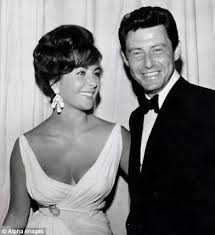
 Adam Gibbs as the cuckolded clueless Eddie Fisher, the man who left his wife Debbie Reynolds for Elizabeth Taylor, provides just the right combination of posturing famous singer and schlemiel who is the last one on the train to recognize that he has lost his wife. Gibbs' Fisher reminds me of the sad clown husband character from Chicago who devotedly would have kept his straying wife but is ultimately abandoned. But unlike the husband in Chicago we know Fisher's hands are not at all clean and that there is a certain poetic justice to the affair lighting up between his erring wife and the Welsh actor.
Adam Gibbs as the cuckolded clueless Eddie Fisher, the man who left his wife Debbie Reynolds for Elizabeth Taylor, provides just the right combination of posturing famous singer and schlemiel who is the last one on the train to recognize that he has lost his wife. Gibbs' Fisher reminds me of the sad clown husband character from Chicago who devotedly would have kept his straying wife but is ultimately abandoned. But unlike the husband in Chicago we know Fisher's hands are not at all clean and that there is a certain poetic justice to the affair lighting up between his erring wife and the Welsh actor.
Bob Balaban, the director, is one of those faces you recognize but don't always remember his name. He has been in a wide range of movies, as a wide range of characters –  from the oddly named but sweetly thoughtful Dr. Chandra in 2010,
from the oddly named but sweetly thoughtful Dr. Chandra in 2010, 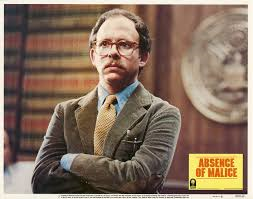 to the corrupt federal investigator in Absence of Malice,
to the corrupt federal investigator in Absence of Malice, 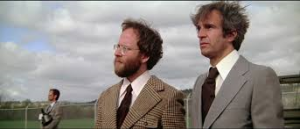 to the charmingly out of his depth cartographer in Close Encounters,
to the charmingly out of his depth cartographer in Close Encounters,  to the ill-fated film critic in Lady in the Water and
to the ill-fated film critic in Lady in the Water and 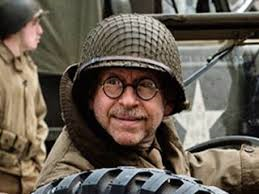 the art connoisseur in The Monuments Men. Mr Balaban has had a long career in Hollywood as a gifted actor, director, writer and producer. He even has a singing credit in Woody Allen's Deconstructing Harry. But this directorial outing of Cleo will stand out as one of his best works.
the art connoisseur in The Monuments Men. Mr Balaban has had a long career in Hollywood as a gifted actor, director, writer and producer. He even has a singing credit in Woody Allen's Deconstructing Harry. But this directorial outing of Cleo will stand out as one of his best works.
There is no whitewashing or lionizing of Taylor and Burton's scandalous behavior, the drunkenness, or the betrayal of their spouses. There is a scene in the stage play Lion in Winter in which Queen Eleanor reminisces to her son Richard about the first meeting between herself and his father, Henry II. Eleanor had been married, at the time, to King Louis of France. However, Eleanor recounts of Henry: "He came down from the North to Paris with a mind like Aristotle and a form like mortal sin. We shattered the commandments on the spot." This line echoed in my head as I watched Cleo. The violent passion between Taylor and Burton washes over the audience, exposing both their strengths as well as their all too human weaknesses. We see behind the Wizard's curtain and much like the fascination one might have for a slow motion train wreck, it is not always pleasant to see but it is absolutely captivating and mesmerizing to watch.
The movie, Cleopatra, destroyed the careers and health of two directors, wrecked at least two marriages and almost bankrupted 20th Century Fox. Cleopatra was drastically behind schedule and grostesquely over-budget when 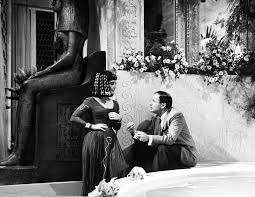 Joseph Mankiewicz took over the director's chair from Rouben Mamoulian.
Joseph Mankiewicz took over the director's chair from Rouben Mamoulian. 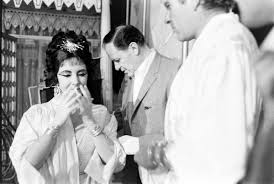 Without a viable shooting script to this disaster on wheels, rewrites were occasionally not completed until the night before, organization was poor and money was thrown willy-nilly at problems that should never have arisen. The entire cast and crew, trying to recreate the hot dry Egyptian climate in chilly damp London was moved to Rome. One scene was to be shot on the beach at Anzio. Rights were obtained, permissions were granted, and construction workers were killed from the detonation of a live mine left over from World War II. Shooting was once again delayed as a minesweeper had to be hired to prevent another tragedy. Elizabeth Taylor almost died from double pneumonia during the shoot. Established famous character actors had to be hired and paid for, in some cases months beyond the time for which they were originally contracted, as delays mounted one upon another.
Without a viable shooting script to this disaster on wheels, rewrites were occasionally not completed until the night before, organization was poor and money was thrown willy-nilly at problems that should never have arisen. The entire cast and crew, trying to recreate the hot dry Egyptian climate in chilly damp London was moved to Rome. One scene was to be shot on the beach at Anzio. Rights were obtained, permissions were granted, and construction workers were killed from the detonation of a live mine left over from World War II. Shooting was once again delayed as a minesweeper had to be hired to prevent another tragedy. Elizabeth Taylor almost died from double pneumonia during the shoot. Established famous character actors had to be hired and paid for, in some cases months beyond the time for which they were originally contracted, as delays mounted one upon another.
BUT, as amusing as these scenarios and anecdotes are, most are wisely not addressed in Cleo. They do, however, provide a fitting backdrop of catastrophic ambiance to the Ground Zero of this nuclear romance.
During a Q&A before the performance, Mr. Bob Balaban spent an hour giving generously of his time to provide some background about the making of this play, spin stories about his personal life in New York as his family founded a string of movie houses, and field questions from an appreciative audience. He was extremely gracious, patient, open, warm, articulate, and friendly. Sort of like how you might imagine Mr. Rogers were he a theatrical director. He very kindly agreed to allow photos, videos and audios be made of the mini seminar. He also waited for anyone who wished afterwards to have a word and a photo. I was one of those who benefited from his affability,  and assuming my technical crew can make the transfer, I will have audio and video excerpts up soon.
and assuming my technical crew can make the transfer, I will have audio and video excerpts up soon.
For the record, I used to think Elizabeth Taylor was a bubble-headed movie star. And to some extent, yes, she was. She made some very bad choices in her life, she drank, she took drugs, she lived to excess. However there was another part of her which I did not know about until doing research in anticipation of seeing the play and writing this blog. Elizabeth Taylor was a convert to Judaism.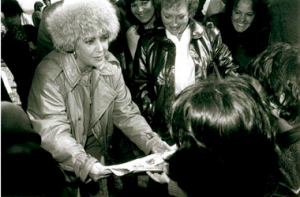 She was quite devoted to Israel and her outspokenness actually got her banned from Egypt even for the production of Cleopatra so that scenes were filmed in Rome with her and exterior shots only were filmed in Egypt without her. She spent the latter part of her life, after her film career, in well known philanthropic projects,
She was quite devoted to Israel and her outspokenness actually got her banned from Egypt even for the production of Cleopatra so that scenes were filmed in Rome with her and exterior shots only were filmed in Egypt without her. She spent the latter part of her life, after her film career, in well known philanthropic projects,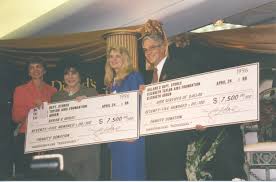 including AIDS research, children's education, and raising money for Israel. However the most astonishing and courageous thing that I discovered she did was something I had never even heard a whisper about before.
including AIDS research, children's education, and raising money for Israel. However the most astonishing and courageous thing that I discovered she did was something I had never even heard a whisper about before.
In 1976 Muslims hijacked an airline carrying 248 passengers. They rerouted to Entebbe, Uganda and threatened all the passengers with murder unless fellow terrorists were released. All of the non-Jewish passengers were released. Elizabeth Taylor, then one of the most famous faces on Earth, offered herself in exchange for the remaining 100 Jewish hostages. The terrorists refused the offer. Not just a PR stunt, the Israli Ambassador to the United States, Simcha Dinitz publically thanked her at the Jewish National Fund Gala, presenting her and her then husband Jack Warner with a certificate for a forest which would be planted in her honor, saying: "The Jewish people will always remember." It was an extremely brave thing to do. Had these Muslim terrorists accepted there is no telling what they would have done to her.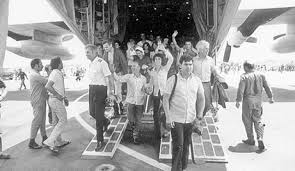 Instead Israeli Defense Forces successfully released almost all of the hostages safely and took out the terrorists.
Instead Israeli Defense Forces successfully released almost all of the hostages safely and took out the terrorists.
While the events in the play Cleo take place over a decade before this real life drama at Entebbe, Cleo's backstage pass look at one of the most infamously known, adulterous affairs in history, reminds us that there is often much more to the players involved than is commonly known. Thanks to Mr. Wright and Mr. Balaban, we have an opportunity to warm our hands by a still shot, an intimate and affectionately humorous peek, at the megaton conflagration that was Taylor and Burton
In 90 minutes the craft of this play is such that we, as the audience, come away feeling we have known these people for years, not just because we have read critiques, seen the movies, scanned articles and sadly noted obituaries about them. But we know these people because we have been given a look at them in their smallness, in the sinful activities of which we are all subject in this Fallen World. Great literature makes one feel that one is a better person after having seen it. That can come in two forms. The story can be of either a good example or a horrible warning. I think you can probably guess into which category this amusing, sad, bittersweet and mesmerizing play falls. As the play Cleo demonstrates, in this backstage pass look at one of the most infamously well known adulterous affairs in history, there is often much more to the players involved than is commonly known.
I predict Misters Wright and Balaban have a justifiably massive hit on their hands. Cleo will only be playing at the Alley Theater through April 29, 2018 so hurry to see it there. It will, undoubtedly find a national run in the near future as word gets out about this emotionally expressive and delightful play, but why wait??!! Treat yourself to a one-of-a-kind experience in Cleo as stars in reel life and real life collide on the Alley Theater stage.
